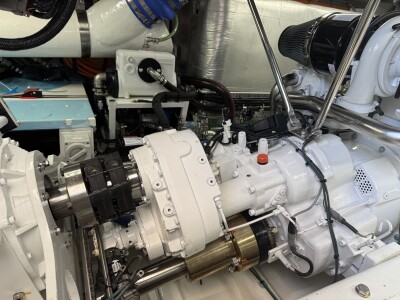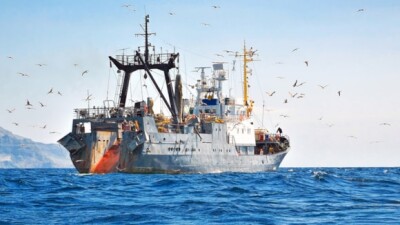Family man
The several hundred people who turned out at a Rhode Island memorial service for Phil Ruhle Sr. were a poignant reminder that fishing is a family business and that to most fishermen, wealth is the fishery you leave to your kids.
Phil, 56, was lost July 23 when his dragger, Sea Breeze, rolled over and sank steaming home with a trip of squid. He went as anyone who knew him would have expected, trying to save the boat after making sure the crew was safe on deck.
Ironically, only a day before the church service for Phil, 100 or so folks had gathered in Narragansett, R.I., among them Gov. Donald Carcieri, to dedicate the Point Judith Fishermen's Memorial. Fifty-six names had been carved in stone. Now there will be a 57th.
The "Man At The Wheel" statue in Gloucester, Mass., is perhaps America's best known fishermen's monument, but over the last decade or so we have seen numerous towns from coast to coast mounting efforts to honor lost fishermen.
"You don't realize what a comfort these fishermen's memorials are" in fishing communities, said Vince O'Shea, executive director of the Atlantic States Marine Fisheries Commission, a one-time fisherman and a career officer in the U.S. Coast Guard. "These people can't go to a cemetery."
Ruhle may have been a New Englander, but he was respected far and wide for his efforts on behalf of sustainable fisheries and responsible managers, and he put his shoulder to the wheel on both accounts.
In 2003, NOAA bestowed its "environmental hero" title on Phil for his efforts to help calibrate the fishing gear on the federal research vessel Albatross after it was learned that a trawl used by the Northeast Fisheries Science Center was woefully out of rig.
More, recently, Phil, working with several others, including his son Phil Jr., took first place last year in the World Wildlife Fund's Smart Gear competition. Their innovation, known as the "Eliminator" trawl, was designed to catch haddock while letting cod and flatfish swim out.
Phil also served in one of the world's most thankless capacities — as a member of the New England Fishery Management Council.
But in speaking of his younger brother at the church service, Jimmy Ruhle, a Wanchese, N.C., fisherman and activist and a council member himself (in the Mid-Atlantic), talked mostly about family and how much it meant to Phil.
Phil may have treasured most the time he spent with his own family, but his life's work leaves little doubt that he saw in the men and women of the U.S. fishing industry brothers and sisters to whom he also was devoted.
* * *
It's fall again, which means our January "Crew Shots" issue can't be far off.
This is your chance to appear on the pages — maybe even on the cover — of a national magazine dedicated to what you do and the life you lead.
This is our third year of "Crew Shots," and while we have been delighted by your offerings, I hasten to add that entries are not limited to Alaska fishermen.
Those of you from the Lower 48 and elsewhere are welcome to submit. Yes, I know there are some New Jersey scallopers saying, "Well, how come you didn't run our shot?"
The deal is we need fairly high resolution photographs: art director Jen Finn suggests that a digital image 1,260 x 945 (pixels) should work, but if your camera has a higher setting, that's OK, too. More pixels mean more details and allow us to better reproduce your breathtaking visage — especially if we're going to get you on the cover surrounded by fish.
Please e-mail them to me by Oct. 31 at [email protected] and enter "crew shots 09" in the subject line.
Please include the name of the vessel, its home port, where the shot was taken (if not in the home port) and the names of all pictured crew members, from left to right (which will save us reordering them and reduce the likelihood of error.) If you are a troglodyte who still shoots slides or, heaven forbid, prints, address them to me at National Fisherman, 121 Free St., Portland ME 04101 and write "crew shots" on the envelope. We will scan the shots and return them to you right away.






